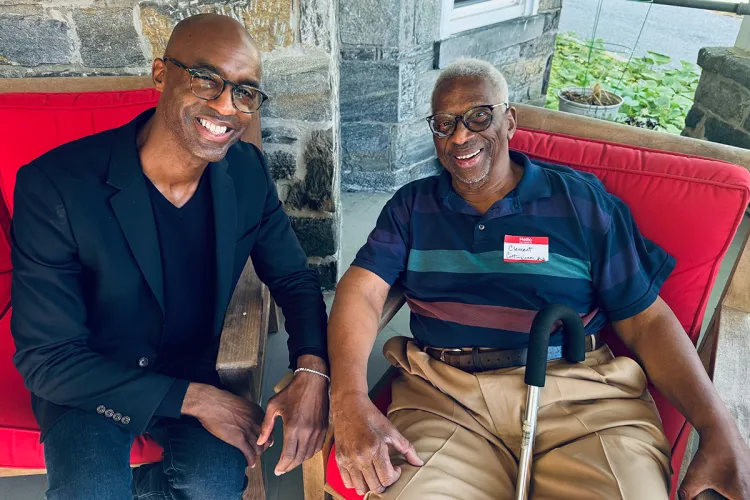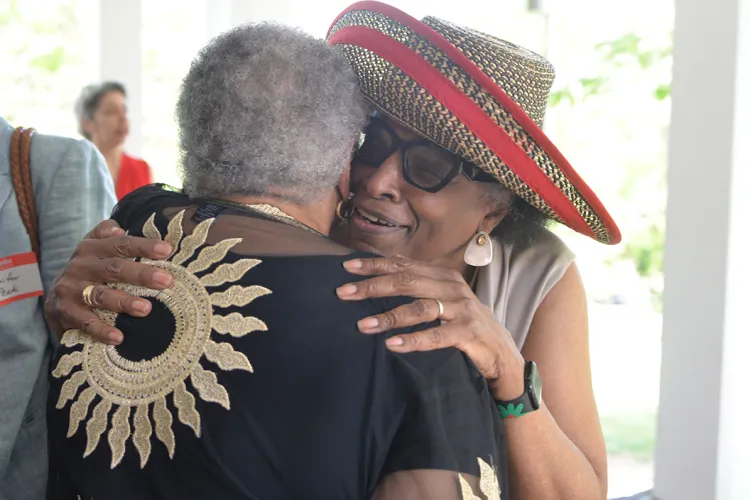The College community gathered in jubilant celebration on May 2 as the long-standing Black Studies Program was officially recognized as an academic department with a major. Held at the Black Cultural Center (BCC) and Singer Hall, the event marked a historic turning point in the College’s academic and cultural life — decades in the making.
The celebration began on the BCC’s front porch, where faculty, students, staff, alumni, and supporters gathered to honor those who built the foundation for this moment. Among the speakers were President Valerie Smith; Joseph Derrick Nelson, chair of Black Studies; Brooke Vick, vice president for diversity, equity, and inclusion; Clement Cottingham Jr., the first director of the Black Studies Program; and several of the co-authors of Seven Sisters and a Brother, the landmark 2019 memoir chronicling Black student activism at Swarthmore in the 1960s.
Nelson welcomed the crowd to this “historic celebration,” and stressed the decades of collective effort that led to the department’s formation, especially the work of the Black Studies faculty committee and those who helped craft the formal proposal.
“Without our collective effort, this day would not have been possible,” he said, giving credit to many professors, past and present, across the disciplines who helped to shape the department.
Read more about the effort and Nelson’s vision for the department

Current Black Studies program director Joseph Derrick Nelson (left) and Clement Cottingham, Jr., first program director.
Smith echoed that sentiment, crediting the Swarthmore African-American Student Society’s “courage, vision, and an historic sit-in” for demanding that “Black life, Black history, and Black culture be recognized as central to the College’s academic mission.” She also made special mention of pioneering faculty members Kathryn Morgan in history and Chuck James in English literature, without whose efforts the program would not have succeeded.
“These early professors were fierce advocates for change, beloved teachers, and mentors who left a lasting imprint on this campus and on generations of students,” Smith said.
Her remarks were followed by those of Vick, who offered a powerful address contextualizing the national climate surrounding Black Studies and DEI work.
“History-making change doesn’t happen all at once, nor is it linear,” she said. “Forward steps, especially in the march toward racial justice and liberation, are often met with backward steps, frequently driven by a backlash rooted in fear.”
Vick called the establishment of the Black Studies Department “all the more meaningful” in this era when institutions elsewhere are dismantling similar programs.
“They want people to believe that diversity work is about exclusion,” Vick said. “But this is what it’s about. It is about creating spaces where representation not only matters but is delivered.
“Today is for Black joy,” she added, “and I’m thrilled to be sharing it with you.”

The celebration began on the BCC’s front porch, where faculty, students, staff, alumni, and supporters gathered to honor those who built the foundation for this moment.
The ceremony also honored 12 graduating seniors pursuing Black Studies, including Brandon Archer, Journey Moore-Prewitt, and Akeyia Nichols, who combined Black Studies with majors in English, biology, and educational studies, respectively. Several Mellon Mays Undergraduate Fellows also attended, five of whom — Archer among them — are headed to prestigious Ph.D. programs this fall, the most ever for both Swarthmore and the fellowship program.
Several co-authors of Seven Sisters and a Brother shared reflections, including mention of Professor Emerita of History Allison Dorsey’s Black Liberation 1969 project that prompted their interest in documenting their story. Marilyn Holifield ’69 informed the crowd that she and her co-authors decided to donate all of the royalties from the book to the College.
Holifield then jubilantly announced that she and her co-authors had recently succeeded in raising more than $100,000 to endow a College fund named for their book. The fund will benefit Black Studies, Holifield noted with great emphasis, “in perpetuity.”



